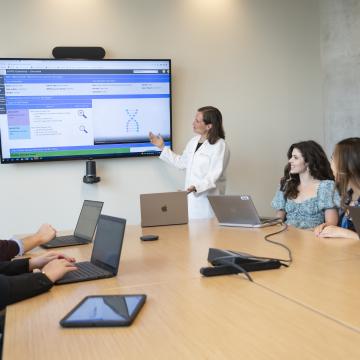Clinical Cancer Genomics
City of Hope's Division of Clinical Cancer Genomics commits to being a national leader in advancing cancer genetics, screening, and prevention through innovative patient care, research and education.
In light of discoveries confirming that common cancers, e.g., breast, ovarian and colorectal, are hereditary, the division's mission is to examine cancer risk profiles through a comprehensive assessment, including family history and environmental and lifestyle-related genetic factors, and provide patients with concrete steps to lower risks proactively.

Who Needs Genetic Counseling or Testing?
You should seek genetic counseling if you suspect you may have an increased risk for hereditary cancer. We encourage you to collect your family history and identify environmental or lifestyle factors before your genetic counseling appointment.
You are a candidate for genetic counseling if you or your family member have had:
- Cancers diagnosed at a young age (before 50)
- Multiple cancers occur independently (not a single type that has spread to other organs)
- Close blood relatives on the same side of the family had a single type or several associated cancers. For example, your mother, her brother and her maternal aunt had colorectal cancer
- Multiple generations affected by cancer
- A rare diagnosis, e.g., male breast cancer, ovarian cancer or paragangliomas
- A pattern of cancers associated with a known hereditary cancer syndrome, e.g., colon and uterine cancers or breast and ovarian cancers
- More than 20 colon polyps in a lifetime
- Noncancerous findings or congenital disabilities associated with inherited cancer syndromes, such as benign skin growths or skeletal abnormalities
- One or more of the above features and from racial or ethnic backgrounds related to an increased risk of hereditary cancer syndrome, e.g., having breast cancer and being of Ashkenazi Jewish ancestry
Hereditary Cancer Syndromes that We Treat
City of Hope’s Division of Clinical Cancer Genomics provides care and conducts research on a variety of hereditary cancer conditions, including but not limited to:
- Birt-Hogg-Dubé Syndrome (BHD)
- Cowden Syndrome (PTEN Hammartoma Syndrome)
- Familial Adenomatous Polyposis (FAP)
- Familial Atypical Multiple Mole Melanoma Syndrome (FAMMM)
- Gorlin Syndrome
- Hereditary Breast and Ovarian Cancer Syndrome (HBOC)
- Hereditary Diffuse Gastric Cancer (HDGC)
- Hereditary Leiomyomatosis and Renal Cell Carcinoma (HLRCC)
- Hereditary Paraganglioma-Pheochromocytoma Syndrome (PGL/PCC)
- Li-Fraumeni Syndrome (LFS)
- Lynch Syndrome (Hereditary Non-polyposis Colorectal Cancer Syndrome)
- MUTYH-Associated Polyposis (MAP)
- Multiple Endocrine Neoplasias (MEN1/2)
- Neurofibromatosis 1 and 2 (NF)
- Peutz-Jeghers Syndrome
- Retinoblastoma
- Tuberous Sclerosis Complex 1 and 2 (TSC)
- Von Hippel-Lindau disease (VHL)